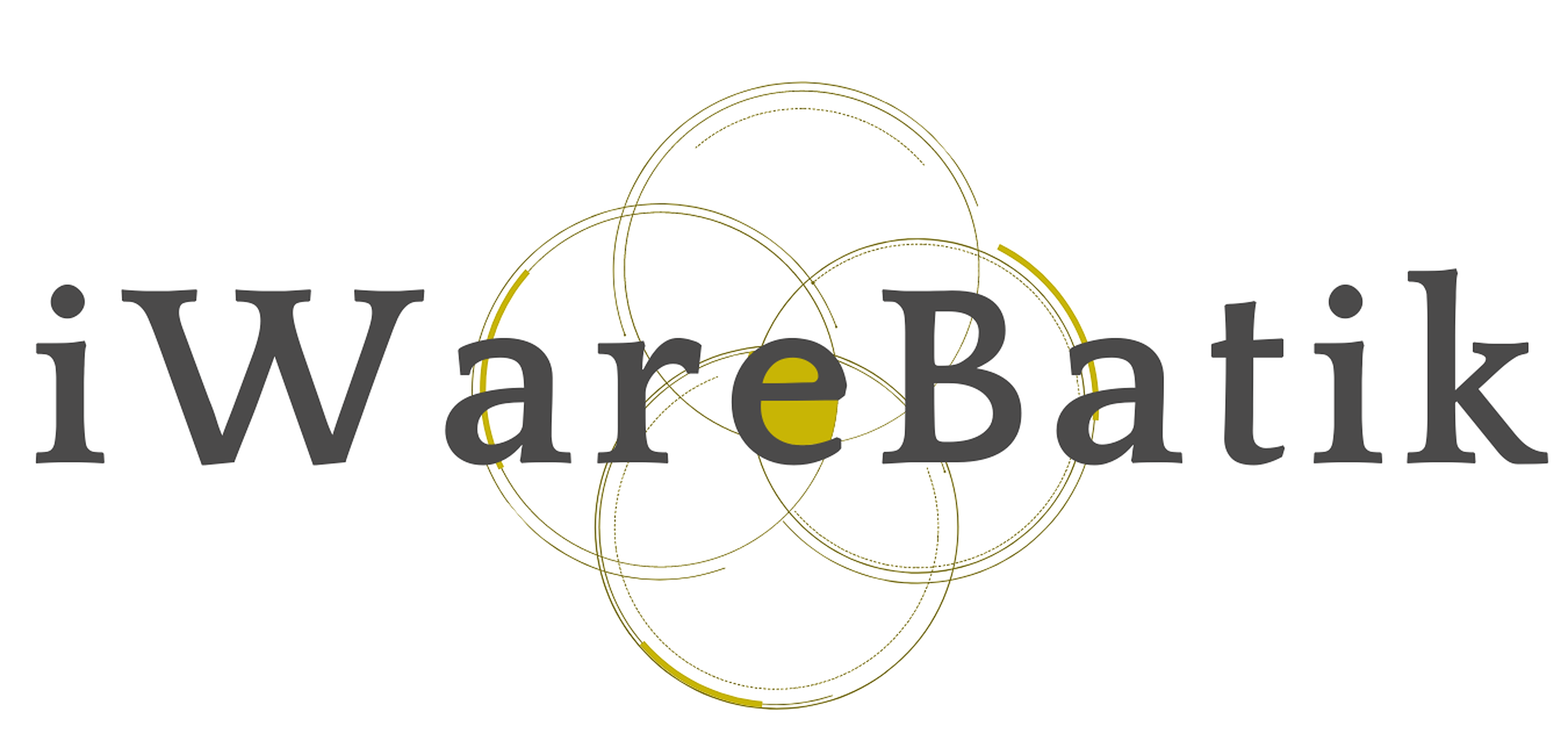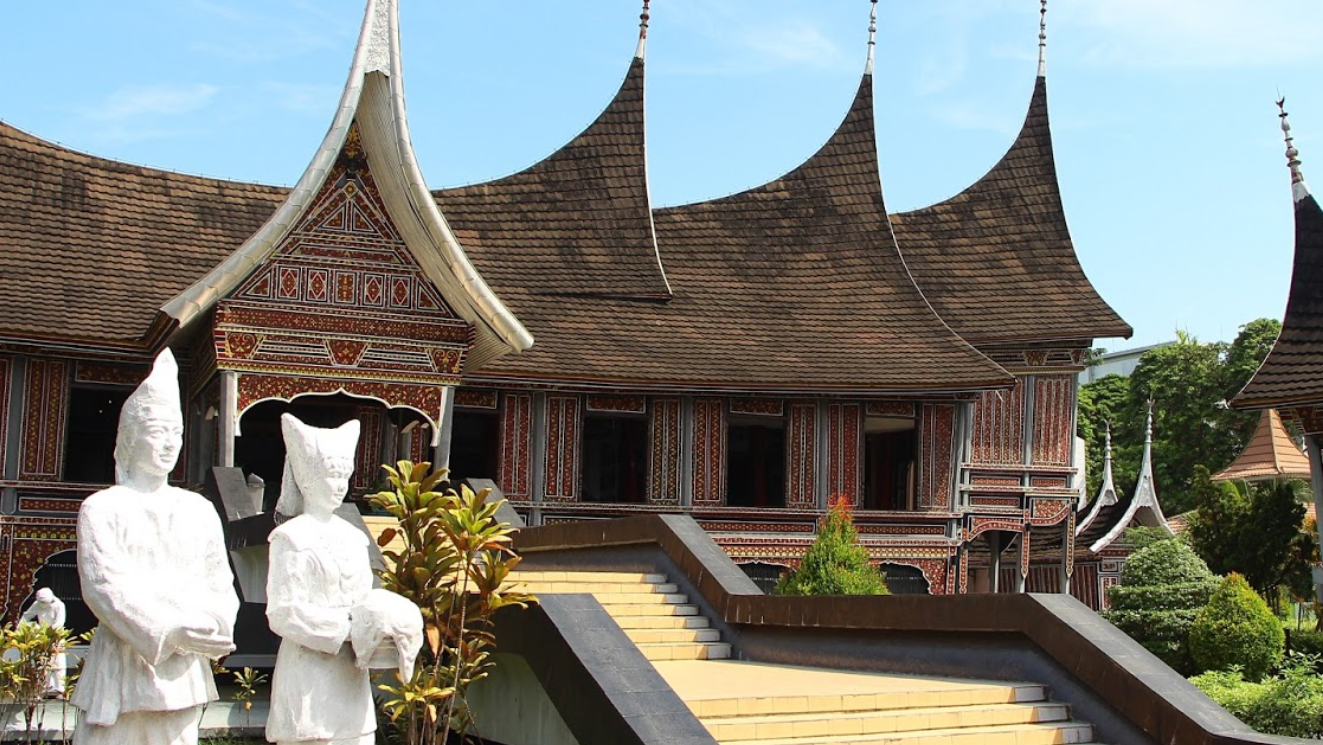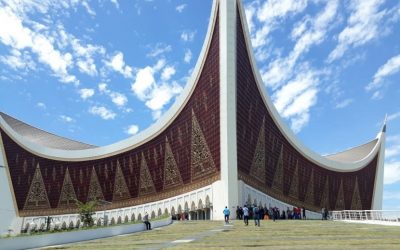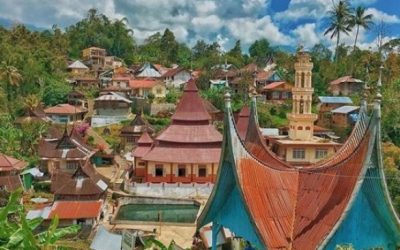Home / Batik Regions – Western Indonesia – Northern Sumatra – West Sumatra / Museum of Adityawarman
Cultural Destination
Museum of Adityawarman
The museum was built to commemorate Adityawarman, a king of Minangkabau enthroned in the 14th century AD. We can find out about the great history of him through some ancient inscriptions found in Saruaso, Lima Kaum, Pagaruyung, and the Bhirawa statue (now in the National Museum – Jakarta). This museum has a collection of ethnology and archeological objects of the Minangkabau people in West Sumatra.
Tourist Attractions in West Sumatra
West Sumatra Grand Mosque
The Great Mosque of West Sumatra is characterized with its Minang-styled air ventilations to
Pariangan Cultural Village
Nagari Pariangan as the most beautiful village in the world, according to Travel Budget
West Sumatra
Batik Motifs
Tanah Liek
The word “Tanah Liek” refers to clay in Minang language. It is also known as
Rangkiang
The word “Rangkiang” refers to the rice granary in the Minangkabau language. It symbolizes
Keluak Daun Pakis
The word “Keluak” is a Minang language which means twisted or tangled. The Motif of
Discover
Indonesian
Batik
Motifs
Rangkiang
The word “Rangkiang” refers to the rice granary in the Minangkabau language. It symbolizes
Kain Cual
Cual textile tradition has existed since the 17th century. The word “Cual” refers to
Singayaksa
The Singayaksa motif comes from the name of a place where Sultan Hasanuddin used to
Lipaq Sabe
Lipaq Saqbe contains a simple geometric classical motif with various flower decorations. This textile is
Jumputan Bintang
The word Jumputan means the tie-dye technique, while the word “Bintang” refers to
Ikan tambal
The word “Ikan” refers to fish. The philosophical meaning of Ikan Tambal means is
Desa Na Tolu
The Desa Na Tolu characteristic pattern symbolizes the Batak philosophy of existence and
Tikar Natuna
The Tikar Natuna motif is adapted from the traditional making of pandanus mats in
Pinawetengan
The Pinawetengan Batik pattern was taken from a prehistoric inscription in
Ukir Sentani
The Ukir motif is a batik motif that is inspired by various traditional Sentani wood carvings
Karawo Pinang
Pinang refers to the Palm areca tree. This motif is considered as the original
Prada Papua
The word “Prada” in the Javanese-Indonesian dialect means a batik textile that
Lontara
The Lontara script itself is a typical ancient script of Bugis and Makassar communities. History records that
Tabir Tanjung
Tanjung flower is a type of Cherry tree flower, which is commonly found in
Awan Berarak
Awan Berarak is a combination of Dayak motifs and Malay patterns. The word ‘Awan Berarak’ means the
Burung Bidadari
Bidadari birds are endemic birds in Halmahera. This motif represents an
Mahkota Siger
Siger is the crown of a noblewoman in ancient time. It is a symbol of femininity, strength, and
Gamolan
This motif illustrates Gamolan, a bamboo musical instrument of Lampung that is
Gedhog Kembang Waluh
a combination of Javanese cultural motif of the Majapahit kingdom (XII-XIV century) with
Dayak Taghol
Dayak Taghol has a distinctive style of four curved lines and small dots. This motif represents
Kaharingan
The Kaharingan or ‘tree of life’ based on the Dayak tribes’ belief system. This tree symbolizes
Srimanganti
The name of the Srimanganti motif is derived from Palace’s hallway that connects to
Kerawang Tegak Aceh
The Vertical Upright (Kerawang Tegak) Motif symbolizes a person who has a strong
Pohon Hayat (Tree of Life)
The Batik motifs in Lampung are dominated by the acculturation of Buddhist and
Pattimura
Pattimura is the name of an Indonesian hero who fought against colonialism in
La Galigo
La Galigo is a literary work of the Buginese Epic that has 300 thousand epic lines. It is considered even
Pala Salawaku
This motif illustrates the unique weapons of the Maluku region, namely
Merak Ngeram
The hatching peacock motif has a very deep meaning which refers to the sacrifice and
Tangerang Herang
Tangerang Herang motif is a symbol of Tangerang city. The Tangerang Herang batik motif consists of
Buketan Bali
The Balinese bouquet (Buketan Bali) is a floral arrangement and the name is
Daun Sirih
This motif illustrates betel leaves that are used by Lombok communities as traditional
Tampuk Manggis Sasirangan
The motif illustrates the philosophy of the mangosteen fruit, which is
Jupri Kembang Teh
Kembang Teh illustrates the tendrils of tea plants that grow in the highlands of
Sido Mulyo
Sidomulyo is one of the classical motifs, which is specifically used for the bride’s costume in
Bintik Tujuh
The Bintik Tujuh (Seven Dots) motif has 7 white spots and green color gradation as
Sekar Jati
Sekar means flower and Jati refers to teak trees that symbolizes a strong mental character that
Lok Baintan Floating Market
As you can imagine, the most authentic thing is that you can buy things and even
Karawo Mahkuta
Mahkuta refers to Gorontalo’s traditional crown. It represents noble characters of
Taiganja
Taiganja is a precious gold pendant that shows the social status of the Kaili family. It is
Malinau Cultural Festival
You will witness a unique competition that might not be found other than in
Cengkeh
The clove flower motif is the main commodity of the Tolitoli Regency. This motif represents
Pucuk Rebung Riau
Pucuk Rebung symbolizes heart determination in achieving goals, good luck, and
Daun Lada Hitam
The black pepper motif represents the main commodity of Bangka Belitung
Hiu Taliyasan
Indonesia is also home to the world’s largest fish, the whale shark (Rhincodon typus). Hiu Taliyasan refers to
Sekomandi
Its philosophical meaning is the eternal union which refers to a saying “until death do us part”
Gorga Simeol-Meol
The Gorga Simeol-meol is a pattern of plant tendrils. it is regarded as a symbol of longevity and
Sandeq
Sandeq Boat is a symbol of the maritime importance of the West Sulawesi region. The greatness of
Rumah Mamuju
the Batik motif illustrates the house of Mamuju King with the stairs, located on the left of the wooden stage house
Dayak Kamang
Kamang motif is generally found in the Dayak tribe shield because it is believed to
Insang Ikan
Insang refers to the gills of the fish. This is a typical pattern of Malay ethnic who inhabits
Bomba Mawar
This motif means sacred love for family, kingdom, and God; It also illustrates
Enggang Dayak
Local people beliefs that hornbills are an incarnation of the Commander of the Birds. It has supernatural
Angsa Duo
According to legend, the Angso duo batik motif is a pair of swans that are believed to have led Princess
Bekantan Pakis
This motif represents Pakis Haji (Polystichum setiferum), an endemic plant in
Tenun Bima
The motifs are adopted from Bima woven textile. This pattern has received a great
Wirasat
Wirasat or divine inspiration is a gift from God. This inspiration is symbolized by
Gurdo Solo
Gurdo or garuda bird is the mount of the Indian god Vishnu. As the Sun Bird,
Parang Rusak
Another meaning behind this motif is an unconquerable spirit, symbolized by
Ake Patra
Ake is related to the divinity and the composition of the universe. It is a symbol of
Leuit Sijimat
This motif reflects the daily activities of the Baduy tribe in Banten. The main ornaments of batik motif consist of:
Gonggong Beruntun
This motif illustrates that a person should maintain a positive attitude and
Bale Lumbu
This motif signifies the welfare of the ancient Sasak society. Bale also symbolizes the
Gajah Way Kambas
The motif illustrates the Lampung’s natural reserve, the Way Kambas. it also symbolizes
Tongkonan
Toraja’s traditional house is called Tongkonan. Tongkonan is a place for
Tubo Kelapa
Coconut tree is a symbol of a good character and strong mentality. It illustrates the more success a person, the more
Gentala Arasy
Built as high as 80 meters, the tower also highlights the historical side of
Kuda Kupang
Horses symbolize wealth. It contains noble values of virtuous characters that bring
Tanah Liek
The word “Tanah Liek” refers to clay in Minang language. It is also known as
Tengkawang Ampiek
With its many advantages, the Dayaks use this leaf in ritual ceremonies. This plant is a symbol of
Manguni Minahasa
Manguni is identified as the symbol of the Minahasa people. Manguni is known as a
Daun Simpor
This motif is inspired by the Simpor plant (Dillenia Suffruticosa) which is a typical
Keluak Daun Pakis
The word “Keluak” is a Minang language which means twisted or tangled. The Motif of
Tifa Totobuang
The batik motifs illustrate Maluku’s traditional music instrument called
Raja Ampat
Raja Ampat motif represents the marine life at Raja Ampat archipelago in



